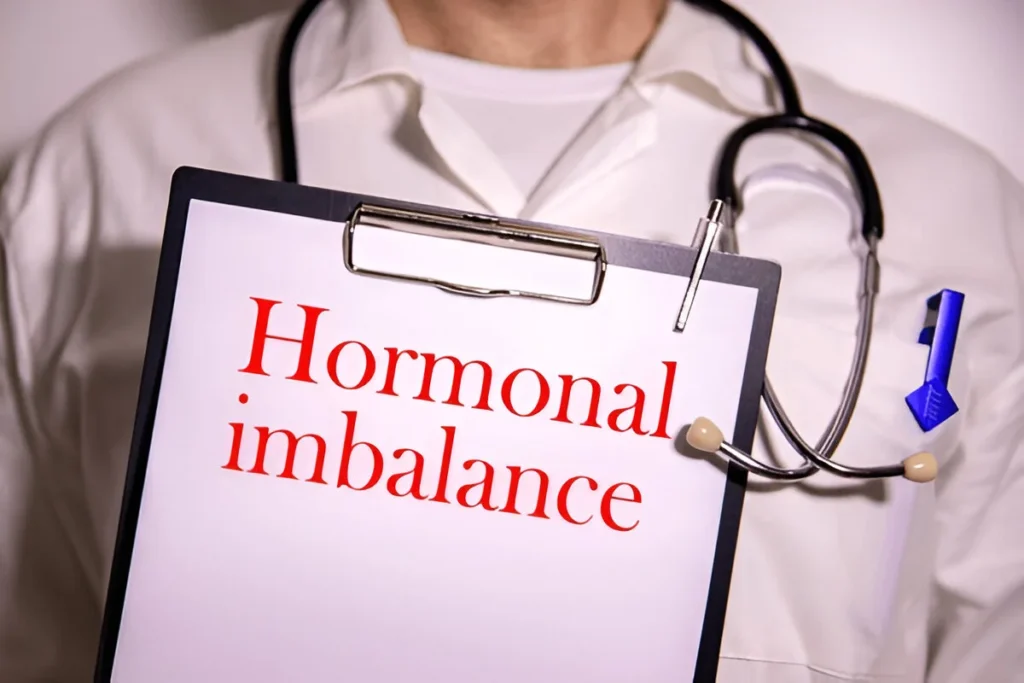-
Ganesh Talkies, Kolkata
Ganesh Talkies, Kolkata

A hormonal imbalance can deeply impact Your Reproductive Health. Understand its causes, effects, and solutions from an expert lady gynecologist.
In today’s fast-paced world, hormonal health is quietly shaping our overall well-being, especially when it comes to your reproductive health. Yet, many women overlook subtle signs, dismissing them as stress or fatigue. However, even slight imbalances in your hormones can influence everything from mood swings to fertility.
Hormones act as chemical messengers that regulate major processes in the body. When these messengers become imbalanced—either in quantity or timing—the ripple effect on reproductive organs can be significant.
Whether you’re trying to conceive, managing painful cycles, or simply aiming for hormonal harmony, this post offers insight into how imbalances can affect your reproductive system and what you can do about them.

Hormonal imbalance refers to too much or too little of certain hormones in the bloodstream. These imbalances can occur due to natural life phases (like puberty, pregnancy, or menopause) or underlying conditions such as:
Some imbalances are temporary, while others may require long-term management. Either way, your body will often signal that something is off, especially in your reproductive system.
If you’ve been feeling “off” but can’t quite pinpoint why, your hormones might be sending signals. Below are common symptoms that hint at an underlying imbalance:
While occasional changes can be normal, recurring symptoms should not be ignored—especially if they disrupt your reproductive health or daily functioning.

Fluctuations in estrogen and progesterone can throw your cycle off track. Irregular ovulation—or none at all—can be a red flag for deeper hormonal issues.
Hormones like luteinizing hormone (LH), follicle-stimulating hormone (FSH), and prolactin are vital for ovulation and conception. An imbalance can affect egg release, fertilization, or implantation.
One of the most common causes of hormonal imbalance in women of reproductive age, PCOS affects both ovulation and hormone levels. It often leads to cysts on the ovaries, irregular periods, and fertility issues.
Excess estrogen can lead to the growth of endometrial tissue outside the uterus, causing severe menstrual pain and fertility complications.
Both hyperthyroidism and hypothyroidism can affect menstrual regularity and fertility. The thyroid plays a subtle yet critical role in regulating your reproductive health.
Balancing your hormones isn’t only about medical intervention. Often, your daily habits can either support or sabotage hormonal health.
If lifestyle changes haven’t resolved the issues or symptoms worsen, consulting a specialist is essential. A comprehensive hormonal assessment can identify the root cause and inform the right treatment—be it lifestyle adjustments, medications, or further evaluations.
Many women silently suffer or self-diagnose without realizing that personalized, expert-led care can restore both balance and confidence.
Working with a professional gynecologist ensures not only accurate diagnosis but also empathetic, evidence-based care tailored to your individual needs.

A combination of irregular periods, mood changes, and skin issues are common indicators. A hormonal profile test and gynecological consultation can confirm the diagnosis.
Yes, in many cases. Diet, exercise, stress reduction, and sleep improvement can help restore balance. However, medical supervision is recommended for persistent symptoms.
Not always. While it can affect ovulation, many women with hormonal imbalances conceive successfully with the right guidance and support.
Not at all. Most tests involve simple blood work or ultrasound scans, which are quick and non-invasive.
Hormonal contraceptives are sometimes prescribed to regulate cycles and symptoms, but they’re not suitable for everyone. A gynecologist will guide you based on your health profile.
Balancing your hormones isn’t just about improving fertility—it’s about feeling like yourself again. Whether you’re dealing with fatigue, painful cycles, or mood swings, small but consistent steps can make a real difference.
Above all, remember that your reproductive health deserves the same care and attention you give to other areas of wellness.
Early intervention, informed lifestyle choices, and trusted expert support can together lead you toward a balanced and empowered life.
If you’re on a journey to reclaim hormonal balance, now is the time to prioritize yourself—because informed care is always the strongest foundation for change.